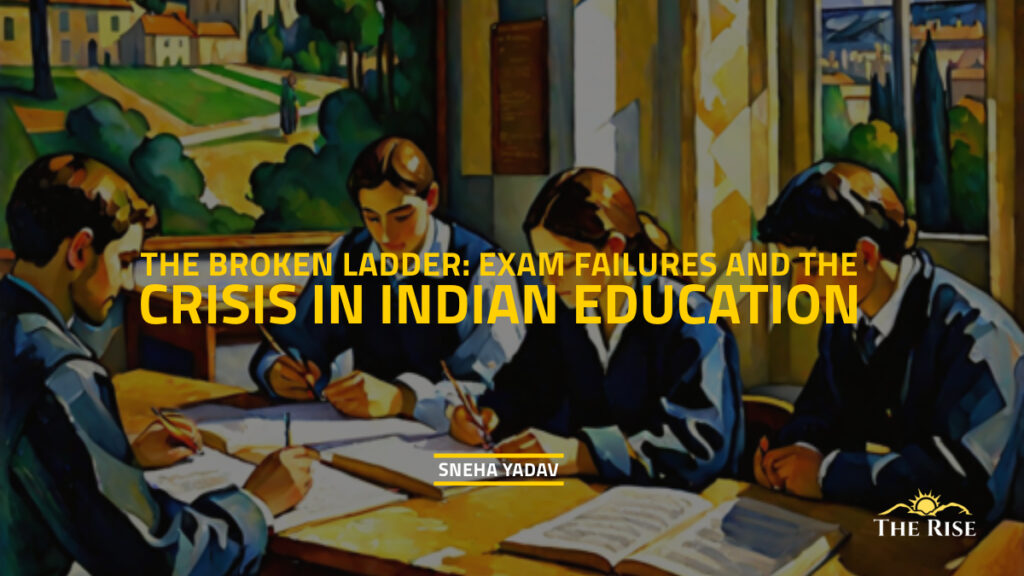According to officials from the Ministry of Education (MoE), over 65 lakh students from across the country did not clear their class 10 and 12 board exams last year.
“Meera’s no more!! This morning, I found her lifeless body hanging on the ceiling!!” Mayadevi’s voice trembled with grief and regret as she recalled her last conversation with her daughter. (Names changed)
Meera had failed her class 10th board exams, and unable to cope with the disappointment, she took her own life.
Meera’s story is a heartbreaking reflection of a broader crisis affecting millions of students across India. According to officials from the Ministry of Education (MoE), over 65 lakh students from across the country did not clear their class 10 and 12 board exams last year.
This alarming statistic underscores a systemic issue that raises questions about the relevance and fairness of board exams in the first place.
Also Read: Why do Indians Go Abroad for Higher Education?
The high failure rates in board exams are not new, but they have reached a point where they demand critical examination. One of the key issues lies in the moderation policies and the politicization of the examination process, which have led to significant disparities among state boards.
Central board students had failure rates of 6% for Class 10 and 12% for Class 12, state board students faced much higher rates of 16% and 18%, respectively.
According to the MoE, the highest number of Class 10 failures was recorded in the Madhya Pradesh board, followed by Bihar and Uttar Pradesh. For Class 12, Uttar Pradesh topped the list, followed closely by Madhya Pradesh.
Also Read: AI Chatbots May Devitalize Ingenuity: Arrival of New Disruptors in Education
The performance gap between students from Central and State boards is also glaringly evident. While the central board students had failure rates of 6% for Class 10 and 12% for Class 12, state board students faced much higher rates of 16% and 18%, respectively.
To resolve the disparities existing across several state and national boards, college entrance exams like IIT-JEE and NEET are designed to level the playing field by assessing students on a national scale.
But, they are far from being a comprehensive solution to the deep-rooted issues plaguing the Indian education system.
These competitive exams, are largely objective and are primarily designed to filter candidates rather than provide a true assessment of a student’s knowledge and capabilities.
While competitive exams hold significant importance, they cannot replace the vital role of school education. School education is the cornerstone of a child’s development, offering foundational knowledge, fostering social skills, promoting critical thinking, and helping bridge socioeconomic gaps. These elements collectively shape the future generations of our society.
Despite its importance, school education is the most neglected. It is currently facing a severe crisis, driven by rampant commercialization and politicization. This has resulted in a lack of a coherent and strategic approach to education, with policymakers often resorting to quick fixes like over-reliance on technology rather than making substantial investments in improving the quality of education.
In this context, NEP 2020 aims to reform school education by proposing the removal of internal exams and introducing comprehensive assessments for Grades 8 and below. These assessments are crucial as they provide a holistic understanding of a child’s abilities, focusing on overall development rather than rote learning.
MoE Report on the 2023 examination results highlights both achievements and areas needing improvement within India’s education system.
However, while comprehensive assessment is a positive step, it is a long-term process. The removal of exams in lower grades may leave students underprepared for the examination challenges of Class 10 and Class 12 board exams, potentially contributing to lower pass rates.
“What will they say? My parents, my relatives… They’ll all be so disappointed. Society won’t see the Meera who won all those trophies; they’ll only see a failure.” said Maya with her voice trembling as she remembered Meera’s words from the night before. “This exam took my daughter’s life” she added.
The Indian education system has long been criticized for its “Russian Roulette” examination approach, where scores and merit often seem like a matter of chance rather than a true reflection of a student’s potential.
MoE Report on the 2023 examination results highlights both achievements and areas needing improvement within India’s education system. It reveals significant disparities in performance across various boards, ongoing challenges in student retention, and the urgent need for a more standardized curriculum.
Also Read: Implementation of NEP 2020 in Higher Education: Challenges & Way Forward
As families like Mayadevi’s grieve their losses, the demand for educational reforms and greater awareness of student mental health intensifies. In a country where academic success is often viewed as the only route to a secure future, stories like Meera’s serve as a stark reminder of the human cost of this relentless pressure.
Disclaimer: The views expressed in this article are of the author solely. TheRise.co.in neither endorses nor is responsible for them. Reproducing this content without permission is prohibited.
About the author
Sneha Yadav is an electronics engineer with a postgraduate degree in political science. Her interests span contemporary social, economic, administrative, and political issues in India. She has worked with CSDS-Lokniti and has been previously associated with The Pioneer and ThePrint.









































































Pingback: Strategy against Corruption: Quest for Good Governance - TheRise.co.in
Pingback: Teachers in Chakravyuh: Guru, Researcher or Contractual Worker?